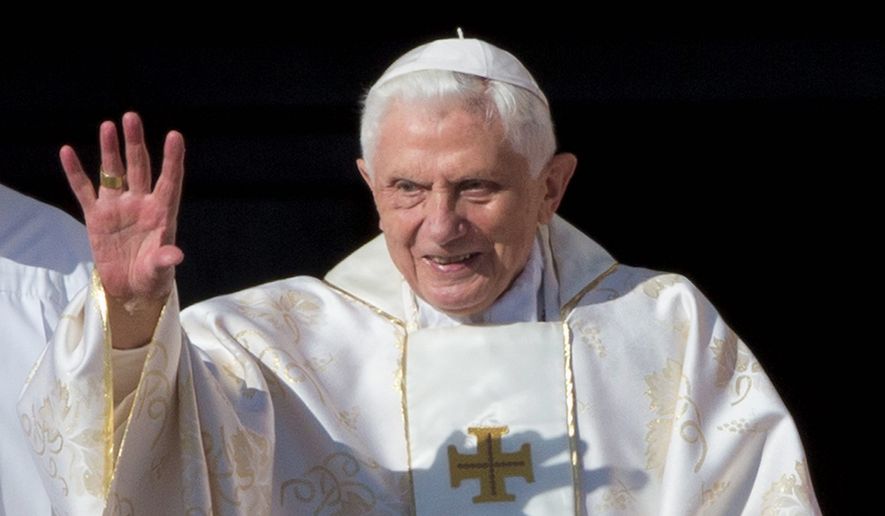Pope Emeritus Benedict XVI on Thursday blamed the sexual revolution of the 1960s for the clergy sex abuse crisis roiling the Roman Catholic Church in a lengthy essay that reads as part-memoir and part-polemic against progressive theology.
In his nearly 6,000-word essay, Benedict denounced the collapse of “normative standards regarding sexuality,” lamented long lines for pornographic films in the German town where he lives and decried lenient attitudes toward pedophilia as straining traditional Catholic sexual morality in seminaries, schools and homes.
His essay was published Thursday in Klerusblatt, a German monthly mostly read by priests, and was translated into English on some conservative Catholic news sites. It was greeted with criticism and acclaim from American theologians and sexual abuse experts.
Michele Galietta, who worked on the U.S. Conference of Catholic Bishops’ 2004 study of 50 years’ worth of clergy abuse charges, said the former pope’s hypotheses to explain the cause of clerical sexual abuse are unfounded.
“The swinging ’60s may have been about free love, but it wasn’t about free love with 6-year-olds,” said Ms. Galietta, a clinical forensics professor at John Jay College of Criminal Justice.
In a Facebook post, Father James Martin, a prominent Jesuit and editor-at-large of the Jesuit magazine America, said he has “greatest respect for Pope Emeritus Benedict XVI” but his essay “dramatically misses the mark.”
“[Pedophilia] is obviously immoral,” Father Martin wrote. “[B]ut it is also a disease.”
But Catholic University theology professor C.C. Pecknold wrote on the Catholic Herald website that he was buoyed by a spiritual answer to a criminal problem.
Under the headline “Why Benedict’s Intervention is so important,” Mr. Pecknold wrote: “What is at the root of the crisis which strikes so powerfully at the credibility of the faith? And then a rare letter appears on our doorstep form an elderly bishop who once sat in Peter’s chair.”
The Archdiocese of Washington referred questions about the letter to the U.S. Conference of Catholic Bishops, which said it did not anticipate issuing a statement.
The Vatican’s official news service headlined the essay “Pope emeritus Benedict XVI: Return to God to overcome abuse crisis.”
Benedict, who turns 92 next week, resigned from the papacy in 2013 — the only pope in modern times to have done so. His essay struck a sharper, more critical tone than that of current Pope Francis, who has sought to engage with victims of past clerical abuse. In his essay, Benedict referred to a victim to show how the church has been harmed in the sexual abuse crisis.
He said a woman had told him that she could no longer take Holy Communion because the priest who sexually abused her uttered the Eucharistic litany, “This is my body, which will be given for you.” He said the woman’s qualms could be overcome with prayer and obedience.
“It is obvious that this woman can no longer hear the very words of consecration without experiencing again all the horrific distress of her abuse,” he wrote. “Yes, we must urgently implore the Lord for forgiveness, and first and foremost we must swear by Him and ask Him to teach us all anew to understand the greatness of His suffering, His sacrifice.”
As evidence of the damage wrought by the sexual revolution, Benedict noted that airlines have stopped showing “sex films” during flights because passengers would break out into violence, adding that “all-out sexual freedom” helped precipitate the sex abuse scandal.
In addition, he positioned himself as an outsider from the church hierarchy in his essay, chiding “homosexual cliques in seminaries” and fondly recalling seminarians who read his writings “under their desk” for fear of being punished by liberal theologians who saw the German cleric’s emphasis on “natural law” as too conservative and out of step with reforms ushered in by the Second Vatican Council in the 1960s.
Ms. Galietta said that a rise in clerical abuse cases coinciding with the sexual revolution could be the result of gaps in reporting.
“One plausible explanation [is] that there were many undocumented cases,” she said. “What we’re really looking at is power differentials. That was what church abuse was all about: power and access to vulnerable kids.”
“This is an embarrassing letter. The idea that ecclesial abuse of children was a result of the 1960s, a supposed collapse of moral theology, and ’conciliarity’ is an embarrassingly wrong explanation for the systemic abuse of children and its cover-up,” tweeted Brian Flanagan, who teaches theology at Marymount University in Virginia.
The pope emeritus ended his essay with a conciliatory tone toward his successor — and papal residence neighbor.
“At the end of my reflections I would like to thank Pope Francis for everything he does to show us, again and again, the light of God, which has not disappeared, even today,” Benedict wrote.
• Christopher Vondracek can be reached at cvondracek@washingtontimes.com.




Please read our comment policy before commenting.